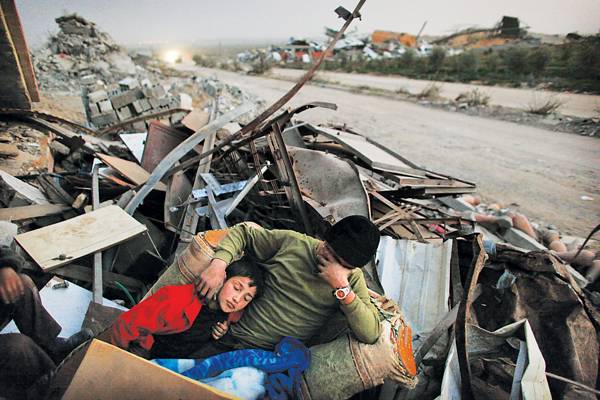PRELL: Today’s patriotism not ‘black and white’

Palestinians from the Hamouda family rest in the rubble of their home in the devastated area of east Jebaliyaon Monday. The latest Israeli incursion into Gaza was aimed at the territory’s Hamas rulers, and ended Jan. 17 with nearly 1,300 Palestinians dead. Photo: Kevin Frayer/Associated Press
January 26, 2009
Al-Qaida, Israel, Islam and Sept. 11. These have become extremely common terms in our day-to-day language as of late, tossed about without care for the truth.
Unfortunately, if today’s culture wars have shown us anything, it’s that truth is never absolute.
When the now-infamous Reverend Jeremiah Wright gave his Sept. 11 sermon and spoke that powerful statement, “America’s chickens are coming home to roost,” he became a divider of emotions and thought. Public backlash was far and wide as the majority of Americans denounced Wright as “un-American” and worse.
I sighed. It was as if, watching the television, I had somehow been transported back in time to the months following Sept. 11, hearing slurs of “raghead,” “camel jockey” and more echo down the hallways of my high school. Only now the words were “liberal” and “conservative,” and we focused our collective hatred on each other.
It wasn’t right to think about why. It wasn’t patriotic to wonder what we should do next. It wasn’t American to ponder the ramifications of the hidden — yet massive — cloud of xenophobia hanging over our heads.
And now I find myself asking those same questions, wondering what to do as a patriotic American. I wonder what to do as an agent of change and education.
Sept. 11 was a tragic time in our nation’s history. We should never forget that. But we cannot see Sept. 11 as something that came from nowhere. We cannot act as though Sept. 11 was the origin of all dark things. Likewise, we cannot act as though the conflict in Gaza has come out of the blue with no history behind it or that there is only aggressor and victim. Both sides have their own motivations, their own causes.
And, like us, they too are susceptible to propaganda.
Stateside, it is nearly impossible to discover the truth of the Gaza conflict. Simply, we cannot experience it firsthand. It is evident, however, that most people’s perceptions of this struggle simply aren’t cutting it. As usual, the public is basing its opinions off of only the bare minimum of information and its emotions.
I’m not here to say who’s right, Israel or Hamas. I’m not here to pretend to have that kind of clairvoyance. But it’s time people began to realize things aren’t black and white. There is no simple right and wrong in this equation.
There are too many variables.
The popular idea is that Israel simply wants to live in peace and the Muslim world that seeks its destruction. Look no further than the Iowa State Daily’s Web site, where a posted comment reads, “You can have peace if Israel wins. You can never have peace if the Muslims win.”
The comment points to Israeli clerics like Yunis Al-Astal, who has said “[Rome] will be an advanced post for the Islamic conquests, which will spread through Europe in its entirety and then will turn to the two Americas, and even Eastern Europe.”
But Al-Astal is a radical whose beliefs do not reflect accurately his own teachings, just as Jeremiah Wright, Rousas Rushdoony, Fred Phelps and others do not accurately reflect the beliefs of the majority of Christians. Islam is not meant to be a hateful, warlike religion, just as Christianity is not meant to spread hate and fear. The perversions of man — not God, not Allah, not any deity — have twisted these faiths into tools to be exploited.
Man is not perfect, and neither is his understanding of the world around him. We tend to think of all Muslims being the same, following the law of Islam. But is it really so difficult to comprehend that, just like Christianity, beliefs are a complex thing that not all interpret the same way? Muslims like Al-Astal and others like him can claim to follow Islam, but they are wrong. They go against basic principles of the Quran and the Sunnah, the teachings they profess as truth.
In the Sunnah, the prophet Muhammad says, “One who kills a non-Muslim person under protection will not even smell the fragrance of Paradise.” The protection that Muhammad refers to is the protection offered to the People of the Book, i.e. Jews and Christians. Therefore, any Muslim who was to kill a Jew or Christian would be automatically condemning himself to an eternity away from Allah.
I continue to hear the notion that the enemies of Muslims seek peace while Muslims are always the aggressors. Using the Quran, we can see that this also cannot be true of a Muslim who honestly follows Islam. It says, “If they seek peace, then seek you peace. And trust in Allah for He is the One that heareth and knoweth all things.”
I’m not saying Hamas is completely justified in its actions. I’m not saying Israel has no right to defend itself. But when the terrible thing that changed our world
happened on Sept. 11, we also did something terrible.
We lashed out without aim. We tried to classify the world into simple categories so we could understand and justify our sadness, our outrage. And in doing so, we have done the pursuit of knowledge a great injustice. We decided we would rather have things one of two ways: for us or against us.
In this new conflict we find ourselves witnessing, we can’t afford to make the same mistake.
– Sophie Prell is a junior in pre-journalism and mass communication from Alta.






